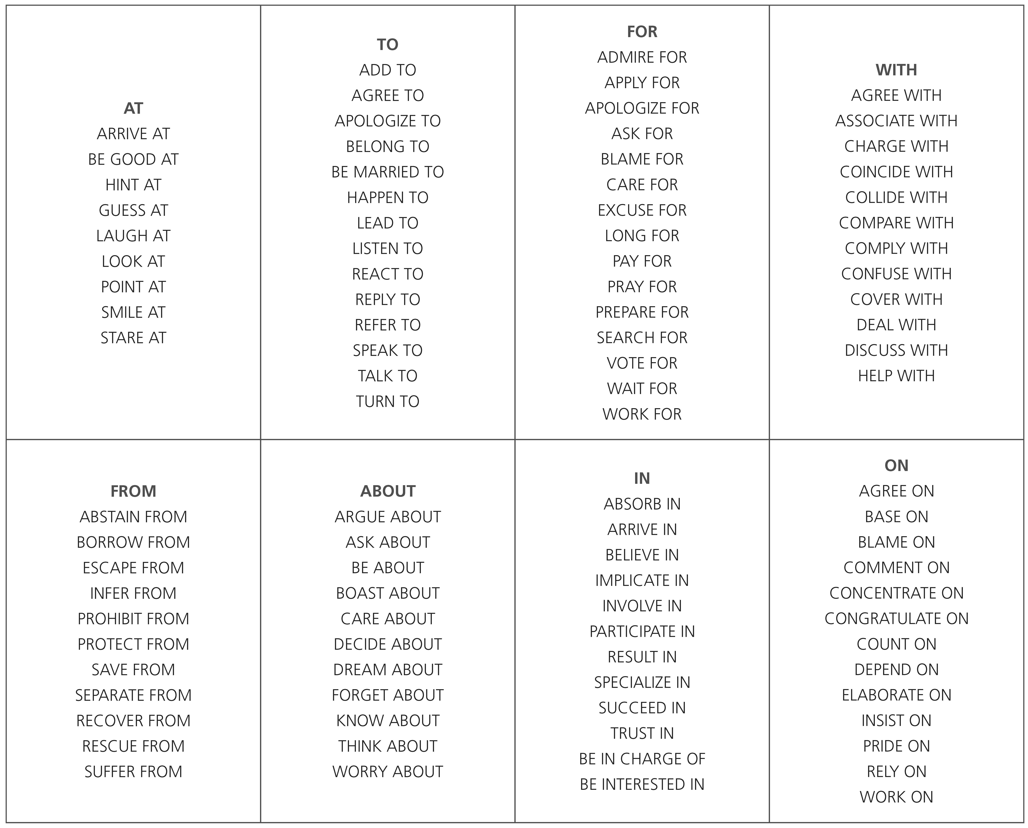Geralmente o significado do verbo frasal é diferente do significado dos termos separados.
Observe:
“To give” signifca dar, enquanto “to give in” signifca ceder, render-se.
“To put” signifca colocar, já “to put up with” possui o signifcado de tolerar, aguentar.
“To make” é produzir, fazer. A combinação “to make up” representa maquiar-se, inventar ou até mesmo fazer as pazes.
TIPOS DE VERBOS FRASAIS
SEPARABLE X INSEPARABLE
Há phrasal verbs que são separáveis e outros que a separação não é possível. Para isso, é necessário classificá-los.
TWO – WORD VERBS
VERB + ADVERB
- INTRANSITIVO (não precisam de objeto para transmitir a informação completa) – Esse tipo de verbo é inseparável.
Exemplos: calm down, catch up, get around, get up, give up, go back, grow up, hang out, hurry up, pull in, turn around, sit down, watch out, wake up.
Eg.: I woke up at 5:30 am today.
Let’s hang out a little.
Please, sit down.
- TRANSITIVO (necessário um objeto para complementar a informação do verbo) – Esse tipo de verbo pode ser separado.
Exemplos: back up, bring up, call off, carry out, cheer up, fgure out, fll out, fx up, give back, let down, make up, pay back, pick up, put off, send back, take over, write down.
Eg.: We need to fll out this form. = We need to fll it out.
I won’t let you down.
They gave back your money. = They gave it back to you.
PREPOSITIONAL VERBS: VERB + PREPOSITION
Esses verbos são inseparáveis
Exemplos: argue about, believe in, concentrate on, deal with, depend on, feel like, focus on, get by, get over, give in, look after, look for, protect from, put on, rely on, send for, talk to, wait for.
Eg.: “Do you believe in life after love?”
Some people say Carol looks like her mother.
I’m looking for another job.
THREE-WORD VERBS
É um phrasal prepositional verb, que é uma combinação de três palavras de diferentes categorias gramaticais – geralmente verbo, advérbio e preposição.
São inseparáveis.
Exemplos: catch up with, check up on, come up with, get away with, get back at, get over with, go along with, go back on, go through with, keep up with, look forward to, look up to, put up with, run out of, team up with, warm up to.
Eg.: Paul had to walk faster so he could catch up with Mark.
I try to look up to my parents’ expectations.
Teachers in Brazil must put up with poor conditions in some schools.
Phrasal verbs são bastante comuns na fala, e os significados não são sempre fáceis de serem deduzidos. Portanto, a melhor forma de estuda-los é introduzindo em seu vocabulário. Há maneiras distintas de absorvê-los. É possível criar uma lista com os principais verbos frasais mais utilizados em língua inglesa, buscar analogias em versos de músicas, nomes de séries ou outras referências da cultura pop que te ajudem a assimilar os verbos frasais ao invés de tentar decorá-los.
A sugestão da unidade é fazer a associação utilizando os principais verbos que formam grandes grupos de phrasal verbs. Como extensão dos seus estudos, anote em post-its, busque referências das séries, filmes e músicas que você consome e/ou escreva exemplos usando essas expressões para ajudá-los na incorporação desses verbos de uma forma menos maçante.
COME – VIR, CHEGAR
Come about – happen; take place
Come across – meet someone or fnd something by chance
Come along – go somewhere with someone; develop
Come by – drop by; visit
Come up with – think of a solution
GET – PEGAR, CONSEGUIR, OBTER
Get along – have a friendly relationship
Get away – escape
Get away with – not to be caught doing something wrong
Get back – return from somewhere
Get back at – get revenge on
Get by – manage to live or survive without much money or help
Get down to – go straight to, start doing something
Get into – be admitted into a school, university
Get over – recover from a disease; overcome a diffcult situation
GIVE – DAR
Give away – reveal a secret; donate
Give back –
Give in – surrender
Give out –
Give up – quit
Give up on – lose hope
GO – IR
Go against – be against someone’s wishes or principles
Go ahead – go on
Go along with – agree with, support a plan or a decision
Go away – leave, go somewhere else / disappear
Go back – return to a place you have been before
Go back on – not to keep a promise
Go by – pass time/ be known by a particular name
Go down – decrease, especially the price or level of something
Go for – choose
*Expressão informal go for it = usada para encorajar alguém a ir atrás de algum objetivo
Go on – continue/ happen/ start to function
Go out with – date someone
Go over – check carefully, examine
Go through – experience diffculties or any unpleasant situation/ complete a phase
Go under – go bankrupt/ sink
LOOK – OLHAR
Look after – take care of
Look back – think about the past
Look down on – consider someone inferior
Look for – try to fnd something or someone
Look forward to – expect with pleasure/ await something eagerly
Look into – examine carefully/ investigate
Look like – resemble
Look out – be cautious of / be careful
Look out for – to protect / to be alert
Look over – look quickly
Look up – look for information in a dictionary, internet / to improve / to raise one’s eyes and look
Look up to – respect and admire someone
MAKE – FAZER; PRODUZIR
Make of – understand, think, interpret
Make out – manage to see or hear / write a check or a receipt/ kiss and touch in a passionate way
Make up – invent a story; reconcile; put on cosmetics
Make up for – compensate for (a mistake, something bad)
PAY – PAGAR
Pay back – return money that is owned to somebody/ get revenge on someone
Pay for – receive punishment for having done something wrong
Pay in – put money in an account; deposit
Pay out – spend or pay a large amount of money
Pay off – entirely pay a debt/ have proftable results, be worth doing
PUT – COLOCAR
Put away – return something to its proper place
Put back – return something to where it came from
Put off – postpone, delay doing something / cause someone to dislike someone or something, repel
Put on – put something on your body: clothes, shoes, perfume / turn on the lights, radio, tv / gain weight
*A expressão informal “be putting someone on” signifca não estar dizendo a verdade, estar enganando alguém → Mike was putting me on when he told he loved me.
Put out – extinguish a fre, cigarette / turn off the light
Put up – build, raise, erect something
Put up with – tolerate
TAKE – TOMAR, LEVAR
Take after – behave or look like an older member of the family
Take away – remove
Take back – return something to where it was before / ask for forgiveness for something that you said
Take for – believe someone is something they are not
Take in – be fooled or deceived by someone or something / to understand fully
Take off – leave the ground on a plane/ vacation from work / remove clothes, shoes, glasses from your body/ become very successful
Take on – hire; accept responsibility
Take out – remove something from somewhere/ take something outside/ take someone to a restaurant or to the movies
Take out on – release bad feelings such as anger, bad mood on someone
Take over – gain control or responsibility for something
Mais uma lista útil para ter, é a lista de verbos preposicionados, ou seja, combinações comuns de VERBOS COM PREPOSIÇÕES ESPECÍFICAS.

Aprofundando:
Há alguns verbos preposicionados que podem gerar dúvidas. Atenção a eles:
AGREE ON – a topic, an idea
AGREE WITH – a person, someone
My mother agrees with my idea about our next vacation. The principal agreed on the teachers’ project.
BE MARRIED TO – estar casado com um parceiro/parceira
BE BARRIED WITH – estar casado e ter flhos
Carol has been married to Jean for three years.
They are married with two children.
APOLOGIZE TO – desculpar-se a alguém
APOLOGIZE FOR – desculpar-se por algum motivo
I apologize to you all for my mistakes.
BLAME FOR –motivo pelo qual a pessoa é culpada
BLAME ON – pessoa que recebe a culpa
Luke blames his mother for his lack of confdence.
Luke blames his lack of confdence on his mother.
DREAM ABOUT – ter um sonho enquanto dorme
BREAM OF – ter um sonho de vida, almejar fazer algo
Sheila dreamt about you two days ago.
I dream of living in London for a long period.




